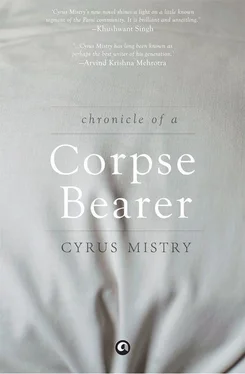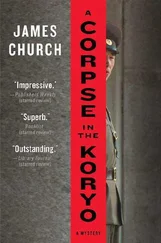My mother had added to this story a small detail which I didn’t feel I should disclose to Seppy. It wasn’t at all significant in that sense; but I remember, I myself was rather shocked to hear it from Mother; for I had never had reason before this to believe my father capable of stooping to such tawdry meanness. Apparently, when he called Rudabeh to hand over the appointment letter for Temoorus, he spitefully declared that given her paramour’s fondness for the bottle, there was no better or more suitable position he could find him.
One other incident from her mother’s brief life, which again I deliberately withheld, not wanting to further humiliate her, or compel her to relive her mother’s shame, humiliating enough for me to think of my own father’s outrageous behaviour:
This was from the time after Rudabeh and Temoorus had moved into their quarters at the Towers, and a sort of thaw had set in their relations with my father. He had himself offered to give his sister a monthly handout of fifty rupees, or thereabouts, to help them tide over their financial difficulties. Only out of the goodness of his heart — not obligation, he had emphasized— and if he should find it difficult at any period in the future to persist with this dole — after all, he had his own wife and school-going son’s needs to look to — he would feel free to stop it, forthwith.
I realize it’s impossible I should actually have been witness to the scene I am about to describe. Not even as an infant in arms — you see, for I was only born a year after Rudabeh met her unfortunate end. And yet, this incident remains vividly before my eyes, as though I had actually been present.
(Which only goes to show, I suppose, that parents should exercise greater discretion when they speak in front of their children. For mere tangential references, snatches of invective or exaggeration as I surely must have overheard in later years, became fodder for my seemingly disinterested but actually heightened child’s receptivity, lodging deep in the recesses of my subconscious mind, and acquiring entity.)
Mother had once described to me and Vispy while we were seated at the table helping her clean the french beans for our dinner — though this must have been specially for Vispy’s ears, I would imagine; she was very close to my elder brother, and often complained to him about various aspects of my father’s behaviour, and besides, she would have presumed I was too young to understand — how at the beginning of every month Rudabeh came to the temple gate and waited outside humbly, until Framroze came out and handed over some money, or sent it across with one of the temple boys if he was too busy. Mother didn’t approve at all of the way he had treated his sister, and felt it was completely wrong that we children weren’t even aware she was our aunt, who visited the temple every month but wasn’t allowed in, and that we actually had a cousin, about the same age as us whom we had never even met.
The scene I seem to recall having witnessed myself, but which I could not possibly have, was one in which standing outside the imposing wrought iron gate under the sun, my aunt absent-mindedly held with both hands, or leaned against, the gate’s ornamental fluted columns. Just then, Father came out himself with the money, and was incensed by what he saw:
‘Don’t touch! Keep away! Don’t press against the gate!’ he yelled at her from across the prayer hall. ‘What are you trying to do, girl? Have me reconsecrate my whole fire temple?!’
Even before she left from there, he instructed one of the temple boys to start washing the entire gate thoroughly with soap and warm water. Her humiliation must have been so great she never came back for her dole again. As it happened, the day after her last visit to the temple, a silver karasyo, that is, a ceremonial pitcher, was found to be missing. Anyone could have stolen it, I suppose, but my father chose to believe it was Rudabeh who was guilty of the theft, which was his explanation of why she never returned for her next handout, the following month, or thereafter.

How much of all that I imagined I remembered was factual, how much compounded by my own overwrought fancy I can’t really tell. But no sooner had I surrendered some of the less painful shards to approximately fit the vacant spaces of the puzzle, Sepideh herself began sifting through the grist of her melancholia trying to make further sense of it.
‘From earliest childhood, I seem to remember that Mother was often missing. She would put me to bed, and go out. If I woke up after she had left, Temoo was always there for me, to soothe me back to sleep with a feeding bottle, a warbling or a petting. But often, I would obstinately refuse to go back to sleep, and continue crying for my Mama; then, agitated, weary and tormented, Temoo would start muttering about his truant wife, would take me in his arms and walk me up and down the room, rocking me, calling her names under his breath which I didn’t quite understand but caught the emotional drift of. .I felt very close to my dad at those times, even believed in his harassed love for me. Didn’t know then, that my mother was out with strangers at his behest and with his approval, doing what she was doing to earn some extra money — which meant, I suppose, money for all of us.
‘When I was old enough to walk about, stay up until later, sometimes I would see them myself: strange men I had never seen before come to pick her up in fancy cars. Only that last night I went to sleep rather early. She had kissed me and tucked me in; I didn’t even know she was planning to go out. The next morning she wasn’t there; when it was evening, and she wasn’t back yet, Temoo grew worried.’
‘He didn’t see the man who picked her up that evening?’
‘He couldn’t give the police a description, nor a name or address. This time, it seems, Temoo told me later, the client had only sent his car and chauffeur. We never saw her alive again. Thirty hours later, the police found her body, dumped on the rocks off Land’s End. Years later, I found out from Merwaan, whose childhood friend and neighbour had grown up to become an inspector in the police force. .’
‘Merwaan?’
‘A khandhia, who died himself soon after. . Somehow, he had kept in touch with this friend. . Merwaan wasn’t even all that old when he died. Just past fifty. .’
‘What?’
‘The post-mortem report showed my mother had been tortured, then strangled. There were cigarette burn marks on her body. Maybe some sexual abuse, too, I’m not sure. Her last client was some kind of pervert it would seem. .I can talk about it now without breaking down. .because it’s you I’m talking to. I know you care. . It must have been horrible for her. .horrible. .’
‘He was never caught?’
‘No, never,’ she shook her head.
‘Poor Rudabeh,’ I said, in a whisper. ‘I’m so sorry. .’
‘Temoo believes that everyone’s death is preordained. .the time, the place, the kind of death we have. . So there’s nothing we could have done to help her, that’s what he’s always said, perhaps to console me. And himself. Though at other times, he’s also raged against Framroze — held him responsible. .’
‘My father?’
‘For never sharing Rustomji’s bequest, small as it may have been, with my mother. If we had a little more money, such escapades as she periodically undertook might have become unnecessary. . Wait, let me show you my mother. .the only photo I have of her.’
It was a fine portrait whose backdrop and lighting suggested it had been photographed in a studio; though the print had faded considerably with time. She was a handsome woman, with strong, broad shoulders, and an impressive bosom, wearing pendant earrings, and three long chains of beads, or semi-precious stones. The smile that flickered on her lips was faint, so removed as though it came from very far away, and wasn’t worn to please anyone. Her eyes showed great depth — or was it simply great isolation? She was clearly a very private person, and it was impossible to read any identifiable feelings into that half-smile, or those expressionless eyes. Sepideh took the photograph back from me, and folded it into the soft cloth she had unwrapped it from, before carefully putting it away. Another time, Seppy said to me, while speaking of her mother:
Читать дальше













